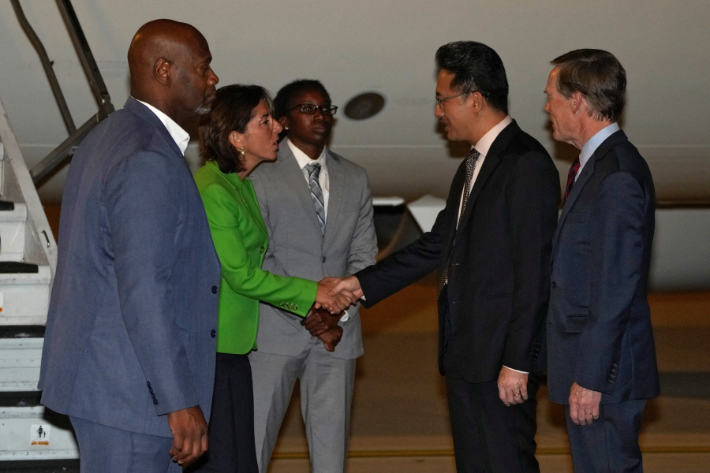US Commerce Secretary Gina Raimondo reached China’s capital Beijing late on Sunday with trade and tourism on the agenda, but declared she won’t ‘negotiate’ with officials on measures aimed to protect America’s national security.
“If you wanted to put a tagline to the trip and the mission, it’s protect what we must and promote where we can,” Raimondo told reporters on Friday before departing for China.
“I’m not going to pull my punches next week when I am there but I intend to be practical.”
Also on AF: China Offering Millions to Foreign-Trained Chip, Tech Talents
Raimondo is the fourth high-level US official to visit China in recent months. She is also the first US commerce secretary to make the trip to China in seven years.
Tensions between Beijing and Washington have spiked since the Biden Administration imposed sweeping restrictions on exports of advanced chips and chipmaking equipment to China in October last year.
The White House aims to further tighten those export controls while pulling in allies Japan and the Netherlands to implement similar curbs targeting China.
US officials have also moved this month to start prohibiting some US investment in sensitive technologies in China.
Reports ahead of Raimondo’s arrival said the commerce secretary would possibly establish a working group with China during her visit to discuss US semiconductor export controls, drawing Republican ire.
However, speaking to reporters Raimondo did not confirm plans for any working group. She emphasised that she would tell Chinese officials “when it comes to national security we don’t negotiate. We don’t give concessions. We don’t compromise.”
Business environment concerns
Raimondo spoke to more than 100 senior business leaders before the visit and vowed to raise their concerns.
“There are so many challenges to doing business in China and exporting to China and China’s unfair trading practices have hurt American workers and companies,” Raimondo said.
Beijing has recently targeted several US firms operating in China in moves widely seen as retaliation to US measures over the past year. Officials are restricting shipments from prominent US chip company Micron Technology and have also raided multiple consultancy and due diligence firms including Capvision Partners and Bain & Company.
Last week, Beijing slapped a $1.5 million fine on US investigations firm Mintz Group for doing “unapproved statistical work,” five months after raiding its office and detaining all its local staff.
Also on AF: US Investors Fear China Backlash Over Biden’s Tech Curbs
US officials have also expressed concerns about China’s newly expanded anti-espionage law, saying it can be used to penalise foreign companies in the country for regular business activities.
Top Chinese officials have warned, meanwhile, that more tit-for-tat measures will follow if the US makes further moves to throttle China’s high-tech sector.
Wendy Cutler, vice president of the Asia Society Policy Institute, said that with a possible visit to the US by Chinese President Xi Jinping less than three months away, “Beijing has an interest in working with the United States to identify practical areas in the economic relationship where cooperation may be possible.”
Boosting trade and tourism
Raimondo also wants to boost trade and tourism between the two countries. Two-way trade between the world’s two-biggest economies plunged 19.6% in the first half of this year.
China and the United States agreed this month to double the number of flights permitted between them – still a fraction of the number before the pandemic.
If China returned to 2019 US tourism levels, it would add $30 billion to the US economy and 50,000 US jobs, Raimondo said.
Raimondo is considering a visit to Shanghai Disneyland, a joint venture of Walt Disney and Chinese state-owned Shendi Group, a source said.
Another looming question is when Chinese airlines might resume taking deliveries of Boeing 737 MAX jets after a four-year hiatus. Raimondo said in 2021 that the Chinese government was preventing its airlines from buying “tens of billions of dollars” in Boeing aircraft.
Boeing says it is ready to deliver airplanes to Chinese airlines “when that time comes.”
Regular communication at the ‘core’
The United States is using government incentives and tax policy to wean American businesses off Chinese supply chains and ramp up US semiconductor production.
“Just because we’re investing in America does not mean at all that we want to decouple from China’s economy,” Raimondo said.
She spoke to President Joe Biden on Thursday about her visit and his message was enhanced dialogue with China can ease tensions.
“We want to have a stable commercial relationship, and core to that is regular communication,” Raimondo said. “We need to communicate to avoid conflict.”
China’s ambassador to the United States, Xie Feng, who met Raimondo last week, said China seeks “mutual respect, peaceful coexistence and win-win cooperation”.
- Reuters, with additional editing by Vishakha Saxena
Also read:
US Checking EV Battery Imports Over China Forced Labour Fears
US to Cut China Access to Amazon, Microsoft Cloud Computing: WSJ
China Curbs Mean Permanent Loss of Opportunities for US: Nvidia
Chip Firms Meet US Officials on China as Lobby Warns On Curbs
Eyeing Top Dollar, China Consulting Firms Tested Beijing’s Limits
China’s Xi ‘True VIP’, Dominating Force at BRICS Summit – FT
























